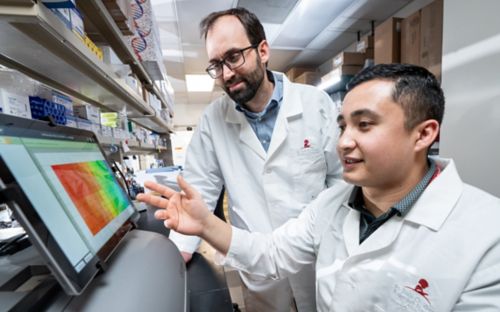PeCanPIE offers powerful tools for discovering inherited cancer genes

Michael Edmonson and Aman Patel, first authors of the Genome Research study and team leaders on the development of PeCanPIE, discuss different ways the portal narrows down the genetic variations in a single patient.
Cancer researchers and oncologists have faced a massive challenge since the invention of gene sequencing technologies that enable analysis of a patient’s entire genome. Sequencing can yield some 4 million genetic variations in a single patient, and the challenge for us is to narrow those down to the few that may predispose to cancer.
At St. Jude, we have developed a powerful software platform that automatically identifies, annotates and classifies such variations—enabling genetic counselors to help families with inherited cancer genes with prevention and surveillance plans. The new platform was an addition to the St. Jude pediatric cancer data portal, which is called PeCan. So, for the new system, we came up with the name “Pediatric Cancer Variant Pathogenicity Information Exchange,” which has the memorable acronym PeCanPIE. We’re making PeCanPIE available for free to researchers and oncologists worldwide. We expect it will aid the search for inherited cancer genes, but also for many other genetic diseases. PeCanPIE currently has more than 400 users, and we are continually welcoming new researchers and clinicians.
The system is the work of some very talented people, and we had a paper on it published in the journal Genome Research. A team led by Michael Edmonson developed the genomic analysis software, and one led by Aman Patel developed the web interface that makes the data readily accessible. They are the first authors of the Genome Research study and are part of the St. Jude Department of Computational Biology, which I chair.
PeCanPIE works by automatically sifting through the millions of genetic variants in a set of genome sequencing data to discover those that may potentially cause a genetic predisposition to cancer. We concentrated on making the platform simple for researchers and clinicians to use. For example, in a feature called MedalCeremony developed by Michael, the system ranks the genes most likely to be pathogenic by awarding them Olympic-inspired gold, silver or bronze medals—making it easy for users to zero in on the most important variants. And in another key feature, the data on each variant are displayed on an easily understood, graphically detailed “variant page” developed by Aman.
PeCanPIE—as an integrated analytical platform—overcomes the limitations of other data-mining systems, which offer separate tools to annotate variants or to classify them for pathogenicity. We recognized that no human analyst could manually classify the vast number of variants emerging from genome sequencing. PeCanPIE provides a mechanism to automatically analyze, classify, and prioritize variants for expert review. It also provides a user interface for formal variant classification, where researchers and clinicians can apply their own expertise to analyzing the variants most likely to be pathogenic.
We have used PeCanPIE to pinpoint key pathogenic genes in more than 1,000 St. Jude patients and more than 3,000 former patients enrolled in the St. Jude Lifetime Cohort Study.
We are continuing such studies and extending PeCanPIE to analyze other inherited disease genes. For example, working with Michael Benatar at the University of Miami and other colleagues, we are extending PeCanPIE to identify genetic variants associated with amyotrophic lateral sclerosis (ALS), or Lou Gehrig’s disease.
Working with colleagues in the St. Jude Department of Hematology, we have also begun a pilot study to create and incorporate into PeCanPIE a database of genetic variants associated with bone marrow transplant failure.
In the future, we hope to extend the system beyond inherited, or germline, genetic variants to include those that mutate after conception to cause cancer. These are called somatic variants.
Clinicians have already used PeCanPIE to analyze a particularly devastating subtype of high-grade glioma brain tumors. These patients have both germline variants and a somatic mutation variant. Immunotherapy was recommended for some patients based on a PeCanPIE analysis.
The other St. Jude authors are Dale Hedges, Zhaoming Wang, Evadnie Rampersaud, Chimene Kesserwan, Xin Zhou, Yanling Liu, Scott Newman, Michael Rusch, Clay McLeod, Mark Wilkinson, Stephen Rice, Jared Becksfort, Kim Nichols, Leslie Robison and James Downing; J. Paul Taylor, of St. Jude and Howard Hughes Medical Institute; and researchers from Sorbonne Université, the Karolinska Institutet, the Centre de Recherche des Cordeliers, Paris; and the University of Miami.
The research was supported by the National Cancer Institute (CA21765, CA21635); the National Institutes of Health’s Office of Rare Diseases Research (U54NS092091); the NIH’s National Institute of Neurological Disorders and Stroke; the NIH’s National Center for Advancing Translational Sciences; and ALSAC, the fundraising and awareness arm of St. Jude.






